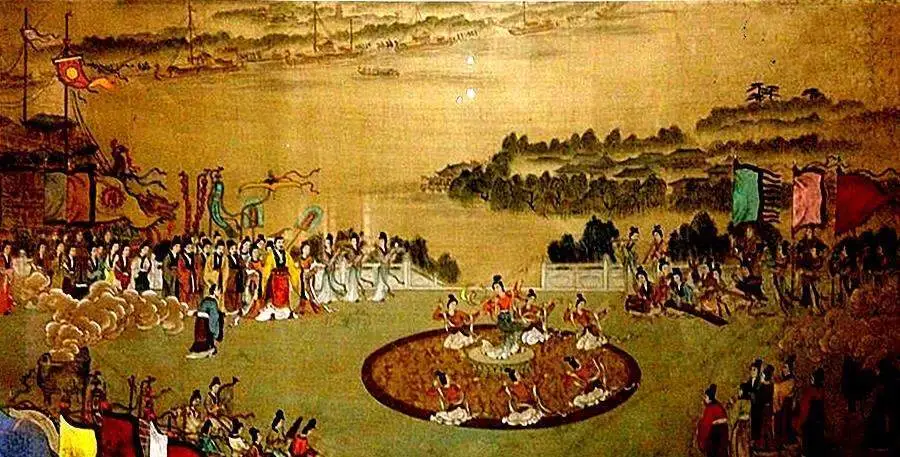Emperor Yang of Sui visited Jiangdu

After Emperor Yang Guang of Sui ascended the throne, in order to strengthen his political control over the whole country and facilitate the transportation of goods from the Jiangnan region to the north, coupled with his personal pursuit of pleasure, he initially did two things: one was to build a new capital city in Luoyang, called the Eastern Capital; The second is to open a grand canal that comprehends the north and south.
In 605 AD, Emperor Yang of Sui sent the minister in charge of construction projects, Yuwen Kai, to build the Eastern Capital. Yuwen Kai was a brilliant engineering expert who catered to Emperor Yang of Sui's pursuit of luxury and made the scope of the project particularly extensive. The primary wood and stone materials needed to make the palace are all transported from the areas south of the Yangtze River and north of the Five Mountains, and it takes thousands of people to pull just one pillar. In order to build the Eastern Capital, two million migrant workers are recruited every month and work day and night non-stop. They also built a large garden in the west of Luoyang specifically for Emperor Yang of Sui to enjoy, called "Xiyuan". Surrounded by 200 miles, the garden has artificial seas and rockeries, pavilions, towers, and exotic flowers and grasses, with everything available; What is particularly unique is that in winter when the leaves fall, they send people to cut colorful silk into flowers and leaves, tie them on the trees, and make this garden evergreen all year round.
In the same year of the establishment of the Eastern Capital, Emperor Yang of Sui ordered the conscription of over one million people from various regions of Henan and Huaibei, from Luoyang Xiyuan to Shanyang on the south bank of the Huai River (now Huai'an, Jiangsu), to open a canal called the "Tongji Canal"; More than 100000 people from Huainan were conscripted, from Shanyang to Jiangdu (now Yangzhou, Jiangsu), to clear a "Han (sound h á n) ditch" opened by King Fuchai of Wu during the Spring and Autumn Period. In this way, the waterway transportation from Luoyang to Jiangnan is much more convenient.
In the next five years, Emperor Yang of Sui twice conscripted migrant workers and opened a canal, one from the north bank of the Yellow River in Luoyang to Zhuojun (now Beijing), called the "Yongji Canal"; One is called "Jiangnan River", which runs from Jingkou (now Zhenjiang, Jiangsu) in Jiangdu to Yuhang (now Hangzhou, Zhejiang). In the end, connecting the four canals became a grand canal that understood the north and south, with a total length of four thousand miles. This Grand Canal is one of the great projects in the history of our country. It plays an automatic role in the development of China's economy, culture, and the reunification of the motherland. It goes without saying that this is what thousands of working people in our country have sacrificed their blood, sweat, and even their lives for.
Emperor Yang of Sui particularly enjoyed going out for parades, both for leisure and to show off his power to the people.
The canal from Dongdu to Jiangdu had just been completed when Emperor Yang of Sui led a large team of 200000 people to tour Jiangdu.
Emperor Yang of Sui had already sent officials to build tens of thousands of large ships. On the day of departure, Emperor Yang of Sui and his wife Empress Xiao boarded two four story dragon boats, each with a palace and hundreds of rooms decorated in a magnificent manner; Next were thousands of colorful boats boarded by palace concubines, nobles, and civil and military officials; The thousands of large ships ahead were loaded with guards and their accompanying weapons and tents. These tens of thousands of large ships are lined up on the canal, connected at the bow and stern, and are actually 200 miles long.
How can such a large fleet navigate? Those who are dedicated to the enjoyment of the emperor have already arranged it. On both sides of the canal, willow lined imperial roads have been built, and more than 80000 migrant workers have been conscripted to pull fibers for them. There are also two teams of cavalry escorting the shore. Colorful boats are sailing on the river, and colorful flags are fluttering on the land. At night, the lights are brightly lit and the music is loud, creating an indescribable luxurious scene.
In order to satisfy the enjoyment of the large number of personnel in the fleet, Emperor Yang of Sui ordered the people on both sides to prepare food and drink for them, which was called "offering food". Those officials in the states and counties forced the people to hold banquets and send them over. Some states and counties even sent hundreds of tables of banquets. Not to mention that Emperor Yang of Sui couldn't eat so much, even the palace eunuchs, nobles and ministers he brought couldn't finish eating all the way. Many leftovers left behind were buried in a pit dug by the shore. But those people who were forced to offer food ended up losing everything.
